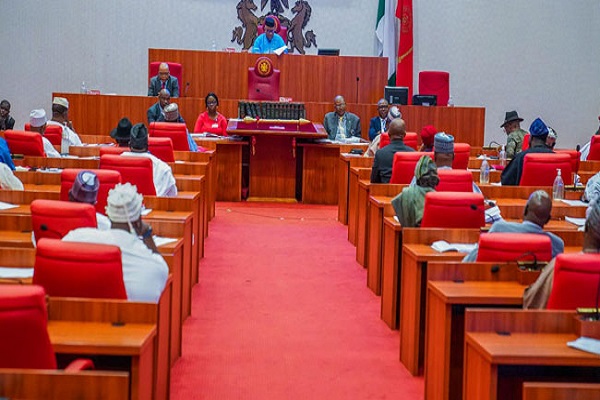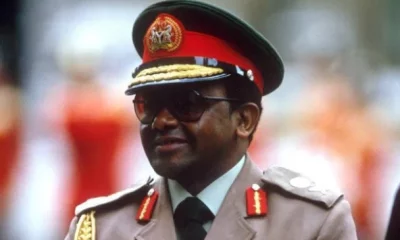News
How We Lost Election For Not Bribing INEC, Police – Obasanjo

Former President Olusegun Obasanjo has recalled how a political party, the Peoples Democratic Party he belonged to in 1998 lost a local government election in Ogun State because he rejected plans to bribe the police and personnel of the Independent National Electoral Commission (INEC).
Obasanjo said party leaders had told him that there should be money allocated for the police and INEC, saying he rejected the proposal on the belief that INEC officials and policemen are government workers earning salaries monthly.
The former President spoke in Abeokuta on Monday at a high-level consultation he organised on ‘Rethinking Western Liberal Democracy in Africa’.
The African leader had told politicians and professors at the debate that he is not always comfortable with the phrase, ‘Nigerian factor’, when discussing democracy and other issues affecting development.
According to him, he came across the ‘Nigerian factor’ slang when the nation held the first local government election and his party lost because politicians said be refused to take cognisance of the Nigerian factor while planning for the election.
“When things go wrong, you said the Nigerian factor. The first thing I learnt in politics was this thing called the Nigerian factor.
“In 1998, we had the first local government election. We had parties, and here in Abeokuta, we met in my office and they came up and said, ‘look, this is money for INEC, money for police.’ At a stage I said, ‘what nonsense! Is the police not being paid, and INEC too?’
“They said ‘that’s how we do it. I said ‘you cannot do that.’ So, they didn’t do that. And of course, we lost all the local governments. We lost all. And then they came to me and said, ‘Baba, you see? If you had allowed us to do it the way we used to do it, we would have won’. And I felt guilty.
“During the next election, which was the State Assembly, I just stayed in my house. I said ‘well, do whatever you want to do, I will not be part of it’. So, I didn’t even go. But, the result was the same. One of the people who got money didn’t even distribute it to where he was supposed to distribute it,” Obasanjo recounted.
The octogenarian emphasised that the Western liberal democracy being practised in Africa has not really taken human nature and the African situation into full account.
While saying it is time to be realistic, the Balogun of Owu said a hungry person will sell his vote for just N1000.
“When you are hungry, whatever anybody tells you cannot go in. Poverty is a great enemy of democracy. Ignorance or lack of education is a great enemy of democracy. And we seem to be deliberately fomenting poverty and lack of education,” he stated.
Headline
Prince Harry visits sick Nigerian soldiers in Kaduna

Prince Harry and his team visited the 44 Nigerian Army Reference Hospital in Kaduna to interact with wounded soldiers who are receiving treatment.
The Duke of Sussex is in Nigeria with his wife to champion the Invictus Games, which Harry founded to aid the rehabilitation of wounded and sick servicemembers and veterans.
Nigeria joined the Invictus Community of Nations in 2022 becoming the first African country to join.
Prince Harry’s visit to Kaduna came 68 years after his late grandmother Queen Elizabeth II visited the state during the time of the late Premier of Northern Region Sir Ahmadu Bello.




News
Senate approves death penalty for drug traffickers

Senate on Thursday, May 9, approved the death penalty for those convicted on the charge of drug trafficking in the country.
The punishment prescribed in the extant NDLEA Act is a maximum sentence of life imprisonment.
The resolution of the Senate followed its consideration of a report of the Committees on Judiciary, Human Rights and Legal Matters and Drugs and Narcotics, National Drug Law Enforcement Agency (NDLEA) Act (Amendment) Bill, 2024.
The Chairman of the Committee on Judiciary, Human Rights & Legal Matters presented the report during plenary, Senator Mohammed Monguno (APC-Borno North).
The bill, which passed its third reading, aims to update the list of dangerous drugs, strengthen the operations of the NDLEA, review penalties, and empower the establishment of laboratories.
Section 11 of the current act prescribes that “any person who, without lawful authority; imports, manufactures, produces, processes, plants or grows the drugs popularly known as cocaine, LSD, heroin or any other similar drugs shall be guilty of an offence and liable on conviction to be sentenced to imprisonment for life” was amended to reflect a stiffer penalty of death.
Although the report did not recommend a death penalty for the offence, during consideration, Senator Ali Ndume moved that the life sentence should be upgraded to the death penalty.
During a clause-by-clause consideration of the Bill, Deputy Senate President Barau Jibrin, who presided over the session, put the amendment on the death penalty to a voice vote and ruled that the “ayes” had it.
But Senator Adams Oshiomhole objected to the ruling, saying that the “nays” had it.
He argued that matters of life and death should not be treated hurriedly, but Barau said it was too late, as he failed to call for division immediately after his ruling.
The bill was subsequently read for the third time and passed by the Senate.
-

 Headline2 days ago
Headline2 days agoSuspend cybersecurity levy– Reps to CBN
-

 Headline2 days ago
Headline2 days agoTinubu resumes work after foreign trip
-

 Business2 days ago
Business2 days agoNigeria needs over $2bn to revive Ajaokuta Steel Plant, says Minister
-

 Headline3 hours ago
Headline3 hours agoPrince Harry visits sick Nigerian soldiers in Kaduna
-

 News2 days ago
News2 days agoShan George’s money returned to Zenith Bank account
-

 Entertainment3 hours ago
Entertainment3 hours agoAMVCA Cultural Day: BBNaija’s Neo, Venita win Best Dressed Male, Female
-

 Metro3 hours ago
Metro3 hours agoEx-Sports Minister laments after hospital neglected him for hours over N80000 deposit





